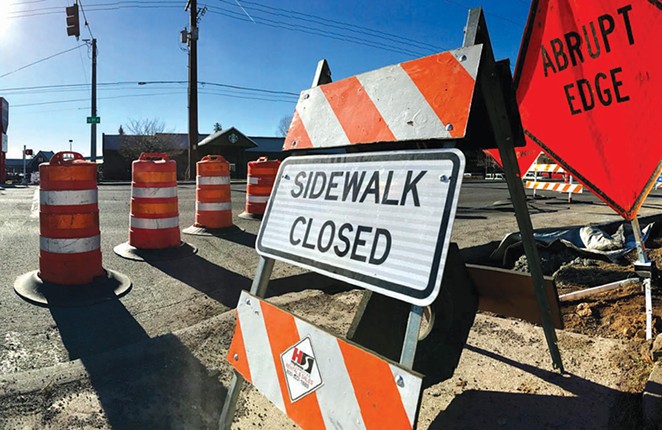The City of Bend is working on adding a new fee to residents' utility bills. The proposed transportation fee would help to support, operate and maintain Bend's transportation system. The fee, which is a funding tool included in the city's transportation system plan, is currently up for discussion in a public engagement process that includes three roundtable meetings.
"We have a growing transportation system. It continues to grow as our population grows, and costs continue to increase over time as well," said Sarah Huston, the transportation fee project manager. "We haven't been able to keep pace with the kinds of costs that are required to maintain the system."
City officials hope the fee will help maintain roads, sidewalks and bike lanes. The fee may also be directed toward improving and expanding local street services such as snow plowing, street sweeping and clearing debris from sidewalks and bike lanes. The funds from the new fee could also help increase safety, maintaining ADA ramps and upgrading speed radars and traffic signals.
The City has a lack of available revenue for maintaining its transportation system which, according to Hutson, has deteriorated the overall quality of Bend's transportation. City Councilor Mark Riley pointed out that while many of the major streets have continued to be well-maintained and overseen, a lot of neighborhood roads have been neglected.
The City accounted for the number of utility account holders and estimated that the fee could cost $15 a month for a single-family home and about $11 a month for a unit in a multi-family complex. According to Riley, city councilors will make certain considerations regarding who pays the fees and may work with lower-income families to adjust or reduce the fees.
The transportation fee was recommended when the city updated its transportation system, which was initially adopted in 2020. A funding workgroup, a subset of the city-wide transportation advisory committee that Riley served on, concluded that the city needed new funding methods to carry out several elements of the plan.
Over the years, Bend transportation has received money from other funding methods that aren't viable in its larger transportation plan. "We're kind of limited in how we can fund operations and maintenance of our system, and so we have to explore these other funding tools," said Hutson.
Unlike many other funding methods that the City has implemented for its transportation, the transportation fee would have no restrictions on it. Bend currently has a gas tax and a general obligation bond funding and supporting its transportation system.
Funds from the gas tax, Hutson said, have decreased over time because of an increase in fuel-efficient cars. In 2020, Bend passed a general obligation bond aimed at adding improvements to the system. The funds from the bond, according to Riley, are important but are limited to new projects and infrastructure, not the maintenance of existing ones.
Sheree Macritchie, a Bend resident since the early '80s, is among the people expressing concerns about residents paying a fee to maintain roads. Tourists also use the roads every day, she told the Source Weekly, contributing to wear and tear, congestion and safety concerns.
The city council is exploring ways that the tourist economy would contribute, according to Riley. One option is looking at how the City will allocate fees for local businesses that serve visitors, since some business types have a greater impact on the transportation system.
"Ideally, we will look at the fees that reflect the impact of a business type on the transportation system," said Riley. "So, it probably won't be just a flat fee for every single business, it, it'll vary some based on impact."
Transportation fees are fairly common and have been put in place for several Oregon cities. The city of Newberg, which had a population of about 25,000 in 2021, has a transportation fee of almost $5 a month for single-family homes. Additionally, single-family residents in Portland pay $6-$12 a month in transportation fees.
The implementation for the transportation fee will be decided after councilors hear discussions from all three roundtables. The first roundtable occurred on Aug. 9 and discussed the goals and improvements to the City's overall transportation. The next roundtable is Sept. 13, where Hutson said a variety of community groups will discuss a more detailed plan about how the funds will be used. The last one is scheduled for Oct. 11.
In addition to discussing the City's strategy for the fee, the roundtables will also serve as a way for the City to account for equity concerns, thinking about how the fee will impact all residents, including low-to-moderate-income families.
According to Hutson, the Council is hoping to make a final decision as early as February of next year. "Maintaining our transportation system is really critical to maintaining quality of life, even for folks who don't drive," said Hutson.
























